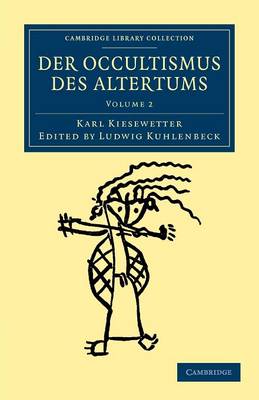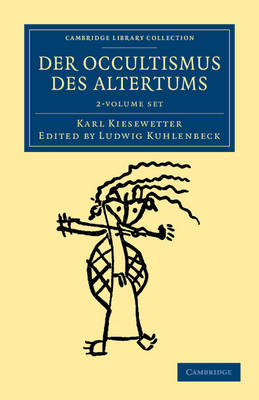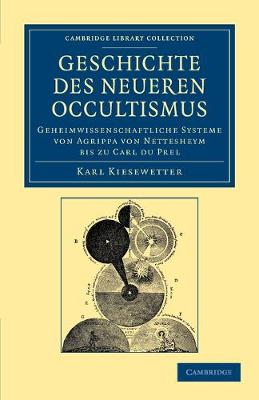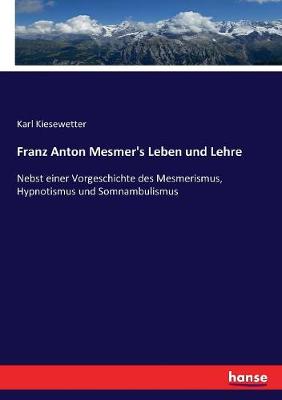Cambridge Library Collection - Spiritualism and Esoteric Knowledge
1 primary work • 6 total works
Volume 2
A leading German theosophical writer, Karl Kiesewetter (1854–95) published several influential works in the years just before his early death. They included a history of modern esotericism (1891), a biography of Mesmer (1893, also reissued in this series), studies of John Dee and of the Faust legend (both 1893), and this two-volume account of occult beliefs and practices in the ancient world (1895), which was completed by Ludwig Kuhlenbeck (1857–1920), a scholar of ancient philosophy and law. Volume 2 focuses on the civilisations of the Mediterranean (Greece, Alexandria, Rome) and northern Europe (the Germanic and Celtic peoples). Each general description is followed by more detailed investigations of particular aspects of that community, such as individuals (Socrates, Philo and Pythagoras), practices (divination, healing and oracles), and teachings (gnosticism, Manicheanism and creation, the afterlife), together with textual excerpts (in German translation).
A leading German theosophical writer, Karl Kiesewetter (1854-95) published several influential works in the years just before his early death. They included a history of modern esotericism (1891), a biography of Mesmer (1893, also reissued in this series), studies of John Dee and of the Faust legend (both 1893), and this two-volume account of occult beliefs and practices in the ancient world (1895), which was completed by Ludwig Kuhlenbeck (1857-1920), a scholar of ancient philosophy and law. This study covers nine civilisations, including those of the ancient Near East (primarily Babylon, Persia, Egypt and Israel), South Asia, the Mediterranean (Greece and Rome) and northern Europe (the Germanic and Celtic peoples). After each general description, Kiesewetter focuses on particular aspects of that community, such as individuals (Zoroaster, Socrates and Philo), practices (divination, healing, magic) and teachings (gnosticism, the Kabbalah, creation and the afterlife), together with excerpts from texts (in German translation).
A leading German theosophical writer, Karl Kiesewetter (1854-95) produced a number of works on esotericism and occult beliefs and practices. This book, first published in 1891, remains one of the most extensive histories of modern esotericism. In his account of its development, Kiesewetter focuses on a number of historical figures who were, in his opinion, highly influential in the field. He discusses the Renaissance esotericism of Heinrich Cornelius Agrippa (1486-1535) and devotes much consideration to Paracelsus (1493-1541), whom he considers to be 'the Luther of medicine'. He also engages with the system of pneumatology developed by Emanuel Swedenborg (1688-1772) and quotes extensively from the works of Jacob Boehme (1575-1624) and other German writers on pneumatology. Also included in this historical overview of modern occultism is the work of Andrew Jackson Davis (1826-1910), who was a leading figure within nineteenth-century American spiritualism.
Karl Kiesewetter (1854-1895) was the most influential German theosophical writer of his time, and wrote several books on the history of esotericism and occultism. This biography of Mesmer (1734-1815) was first published in Leipzig in 1893. It begins with two very substantial historical chapters. The first discusses practitioners of 'animal magnetism' before Mesmer, citing evidence dating back to ancient Egyptian hieroglyphs and Babylonian cuneiform records. The second discusses the history of visions, dreams, trances, soothsaying and divination, referring to the Greeks and the Gnostics. The second half of the book focuses on Mesmer himself. It describes his childhood near Lake Constance, his university education in philosophy and medicine, his medical practice in Vienna and his interest in 'cosmic magnetism'. It documents his treatments and the controversies they caused, his travels, his benefactors and detractors, and ends with a summary of his theories including extracts from his work.
A leading German theosophical writer, Karl Kiesewetter (1854-95) published several influential works in the years just before his early death. They included a history of modern esotericism (1891), a biography of Mesmer (1893, also reissued in this series), studies of John Dee and of the Faust legend (both 1893), and this two-volume account of occult beliefs and practices in the ancient world (1895), which was completed by Ludwig Kuhlenbeck (1857-1920), a scholar of ancient philosophy and law. Volume 2 focuses on the civilisations of the Mediterranean (Greece, Alexandria, Rome) and northern Europe (the Germanic and Celtic peoples). Each general description is followed by more detailed investigations of particular aspects of that community, such as individuals (Socrates, Philo and Pythagoras), practices (divination, healing and oracles), and teachings (gnosticism, Manicheanism and creation, the afterlife), together with textual excerpts (in German translation).
A leading German theosophical writer, Karl Kiesewetter (1854-95) published several influential works in the years just before his early death. They included a history of modern esotericism (1891), a biography of Mesmer (1893, also reissued in this series), studies of John Dee and of the Faust legend (both 1893), and this two-volume account of occult beliefs and practices in the ancient world (1895), which was completed by Ludwig Kuhlenbeck (1857-1920), a scholar of ancient philosophy and law. Volume 1 focuses on the civilisations of the ancient Near East, including Babylon, Persia, Egypt and Israel, and also contains a chapter on South Asia. Each general description is followed by more detailed investigations of particular aspects of that community, such as individuals (Zoroaster), practices (divination, healing and magic), teachings and texts (the Kabbalah and the Bundehesh), together with textual excerpts (in German translation).




